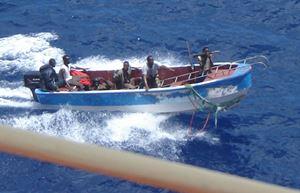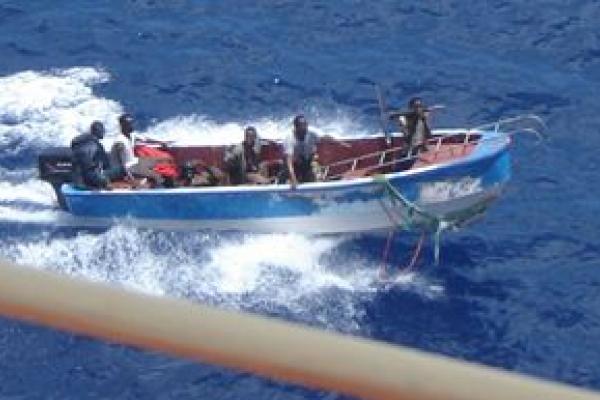
Steamship Mutual
Published: December 01, 2016
Image


The Court of Appeal considers when is an alternative actually the same thing and a ransom reasonable?
Although the decision of the Court of Appeal in this case is relevant to specific points, on specific facts and applying the somewhat esoteric York Antwerp Rules it does illustrate why shipping law remains a fascinating niche. General Average (“GA”) is an ancient concept and although the codifying York Antwerp Rules (“YAR”) keep being tweaked ( most recently YAR 2016 ) they are also of a longstanding pedigree. Despite the weight of history, it still fell before the Court in the 21st century to determine if the cost of running a ship whilst her Owners negotiated with pirates to obtain her release was a GA expense.
GA is essentially a system by which some of the costs or losses incurred rescuing the vessel from peril are shared amongst those with an interest in the vessel in proportion to their financial interest in the vessel and her cargo etc. “Average” is a somewhat anachronistic way to say “loss”. In most cases the mechanistic application of the York Antwerp Rules will determine if an “average” is to be shared between the parties (i.e. “general average”) or should lie where is falls (i.e. “particular average”). In this case there was a disagreement whether certain expenses were general or particular average.
Background
Pirates boarded the vessel during passage of the Gulf of Aden and after a brief shoot out with the Indian Navy, took control of the vessel and forced her crew to sail to Eyl, Somalia. A ransom demand of US$6 million was made and rejected by the vessel’s Owners. Thereafter something akin to a commercial negotiation took place between the pirates’ negotiator and professional negotiators hired by Owners. Eventually after a period of 51 days a ransom payment of US$1.85 million was agreed, and five days later was delivered to the pirates by airdrop into the sea. The pirates released the vessel the next day and the vessel sailed.
The vessel’s cargo was carried pursuant to a bill of lading which incorporated the YAR 1974. During the vessel’s captivity Owners declared GA. Subsequently a GA adjustment was published determining which expenses and losses were to be shared amongst those with an interest in the vessel at the time of her capture, and which costs or expenses were not GA and so should lie where they fell. There was no dispute that the ransom payment was a GA expense; thus cargo paid their share. The GA Adjuster went further, however, and also found that the Owners’ cost of crew wages, bonuses, maintenance and the bunkers consumed during the detention were GA expenses. The rationale behind this decision was stated by the Adjuster as follows:
“… an amount of USD4,150,000.00 was saved in the common interest of all property owners concerned, which would have been otherwise recoverable in General Average as per Rule A of the York-Antwerp Rules 1974. We are of the considered opinion that the expenses, which were incurred during the period of negotiation over the ransom amount, can be allowed in General Average as substituted expense as per Rule F of the York Antwerp Rules 1974, but only up to the amount of General Average expense which has been avoided.”
Rule F of YAR 1974 states “Any extra expense incurred in place of another expense which would have been allowable as general average shall be deemed to be general average and so allowed without regard to the saving, if any, to other interests, but only up to the amount of the general average expense avoided” [the YAR 2016 wording is materially the same]. Whilst the Adjuster believed the crew costs etc fell into Rule F, his contemporaries in the Association of Average Adjusters disagreed, as did the cargo interests, and so the dispute found its way to the High Court.
The High Court upheld the Adjustment in robust terms, stating there was “no doubt” that the expenditure in question was incurred in substitute for a higher ransom payment, and thus Rule F was engaged. The Court also found that if the Owners had paid the original demand of US$6 million this would have been a reasonable course of action meaning the whole of this sum would have been a GA expense. The effect of this finding is that there were two courses open to Owners at the outset:
(i) pay the first ransom demanded, or
(ii) refuse and negotiate.
Following the High Court’s formulation the cost incurred maintaining the crew during the negotiation is a substitute for the difference between the first ransom demand and the final agreed figure.
The cargo interests disagreed and appealed to the Court of Appeal. There were various issues for the Court to determine. For the purpose of this article focusing on just the Rule F issue the question was what is the size of a reasonable ransom payment.
Before the Court of Appeal
The Court of Appeal was content to adopt the High Court’s formulation as to what is required to trigger an expense becoming an alternative GA expense under Rule F. The salient part of this formulation is that for Rule F to apply, there must have been an alternative course of action that, if adopted, would have led to expenditure that would have been GA expense.
Was there an alternative course of action open to Owners in the circumstances? The Court of Appeal reached the conclusion ‘no’: there was in reality only one course of action open to Owners, and that payment of an initial ransom demand or payment following a period of negotiation were two acts on the same continuum, not alternatives. Hamblen LJ held “…payment on demand is simply a different way of going about the same course of action and not an alternative course of action. Whether or not the ransom is paid on demand there will still be negotiation, there will still be delay, there will still be the incurring of vessel and crew running costs during the period of delay. In either case the same expenses will be incurred; the difference is only in their extent.” The Court of Appeal seems particularly to have taken into account the fact that after the ransom had been agreed there was still a period of some six days whilst the mechanics of the airdrop of the ransom and the vessel’s release were discussed between the pirates and Owners, and was then implemented.
Although it perhaps did not need to go further to determine this dispute, the Court of Appeal moved on to consider whether - hypothetically in light of its finding there was no alternative course of action open to Owners - if payment of the initial ransom demand had been paid would this have been rightfully a GA expense? Under Rule A of YAR Rule 1974 (and later incarnations) expenses can only fall into GA if they are reasonably incurred. As such, if it was held that it was not reasonable to pay the initial demand then this would have been another basis on which Owners’ claim for the cost of maintenance would have been stymied: the unreasonable payment of the initial demand would not fall within Rule A and, thus, the cost of maintenance was not an “extra expense incurred in place of another expense” under Rule F.
The Court of Appeal agreed with the High Court that if Owners had paid the original demand of US$6 million this would have been a reasonable course of action and so would not fall foul of Rule A. The Court reasoned that there are obvious risks to people and property whilst the ship is subject to capture by armed criminals. Paying the initial ransom demand may well be the quickest, safest way to rescue the ship, and so this course of action should not be said to be “unreasonable”.
No doubt this reasoning is flavoured by pragmatism and policy: it’s clearly not desirable to try to set a rule of law as to what is, and is not, a reasonable ransom payment. Whilst it seems the Somali pirates were prepared to negotiate ransom payments their modus operandi may not be shared by other criminals engaged in piracy. This point is important not just in the context of a Rule F dispute but also in future piracy related adjustments as well. If the Court of Appeal had found that payment of such an initial ransom was unreasonable one can imagine litigation in future cases where parties seek to avoid contributions to ransom payments as a GA expense on the argument that Owners should have negotiated a better deal and hence the payment made was not “reasonable” under YAR Rule A. It seems the Court of Appeal has put paid to this argument in all but the most extreme cases.
In summary, Owners’ cost of keeping the crew and ship running whilst negotiating a ransom demand does fall into GA. On the other hand an English Court will likely demur from applying a criteria of reasonableness to the size of a ransom payment, although of course these cases are always tried on their own particular facts.
NOTE: The Shipowner appealed the Court of Appeal decision. On the 25 October 2017 the Supreme Court endorsed the approach taken by the adjusters and restored the High Court decision. An article discussing the Supreme Court decision will be published shortly.
Article by David High


